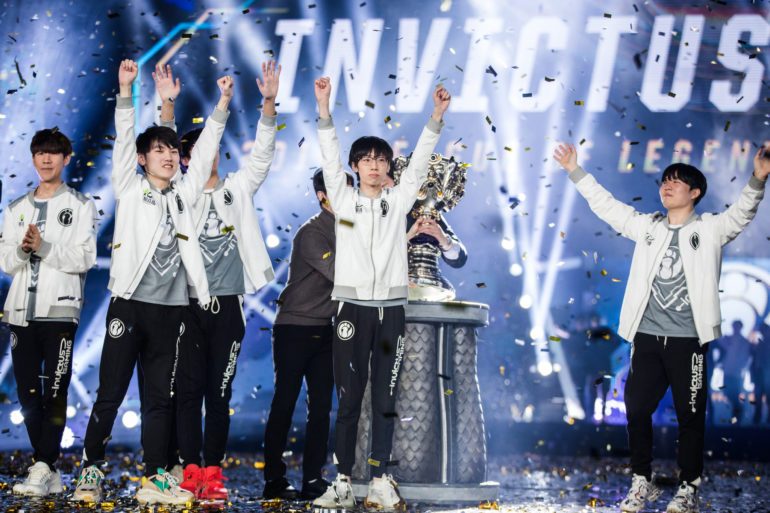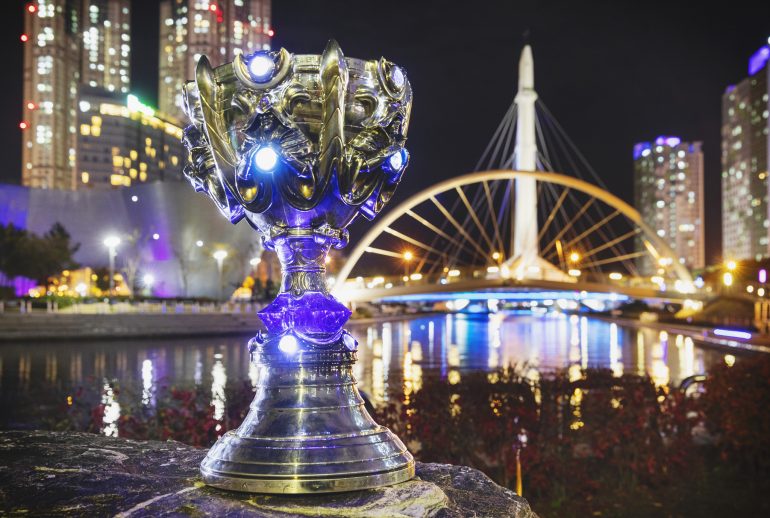SPONSOR: Enthusiast Gaming Holdings Inc. (TSX-V: EGLX) Uniting gaming communities with 80 owned and affiliated websites, currently reaching over 75 million monthly visitors. The company partial 2018 reported revenue of $7.4 million representing a 625% increase over the same period in 2017.

———————————-
Esports Playing in the Big Leagues Now
- In 2018, esports captured the attention of nearly 400 million viewers worldwide—and cable and OTT platforms took note, with media rights revenues topping $180 million.
- Total esports revenues reached $869 million in 2018, and is forecast to more than triple by 2022, reaching $2.96 billion, according to an October 2018 report by Goldman Sachs.
By Lucy Koch
In 2018, esports captured the attention of nearly 400 million viewers worldwide—and cable and OTT platforms took note, with media rights revenues topping $180 million.
Total esports revenues reached $869 million in 2018, and is forecast to more than triple by 2022, reaching $2.96 billion, according to an October 2018 report by Goldman Sachs.
More modestly, a report from PwC (cited by the Goldman Sachs report) projected worldwide esports revenues of $1.58 billion by 2022—an 18.4% compounded annual growth rate.
Ad Revenue
According to PwC, esports revenues totaled $805 million in 2018, with the largest portion coming from sponsorships ($277 million), followed by media rights and streaming advertisements.
PwC estimated that over the next three to five years, media rights revenue would grow 11.5%—to roughly $449 million by 2022. That’s more than twice the growth rate of sponsorship and advertising, at 5.5%.
As audiences grow, so do expectations. Esports viewers want to be able to watch their favorite teams, players and tournaments on any screen, at any time—and this will push profitability.
Paul Verna, principal analyst at eMarketer, explains: “Marketers who try to reach esports fans through video ads will be able to tap into the sophisticated targeting and measurement capabilities that streaming services offer. In that sense, there’s more value to a marketer in attaching itself to game streams than sponsoring an event or team. It’s all about harnessing data.â€
And there’s plenty of data to harness.
Esports Viewers
There were approximately 380 million esports viewers in 2018, and that’s expected to surge to roughly 557 million viewers by 2021, according to a report from Newzoo. Of those 557 million projected viewers, 307 million will identify as “occasional viewers” and 250 million will consider themselves “esports enthusiasts”.
Breaking Down Key Players
Occasional Viewers: People who watch professional esports content less than once a month.
Esports Enthusiasts: People who watch professional esports content more than once a month.
What’s more, Asia-Pacific leads the global esports market and is projected to capture the largest market share, with $1.5 billion by 2022, according to a study from Activate. Close behind, Europe and the US tie for second at $1.2 billion.
“The US is a natural growth opportunity for esports because of the strong gaming culture here, the ties between gaming and sports, and the country’s natural inclination toward competitive endeavors. The same is true of Western European markets, particularly the UK, Germany, and France,†Verna said.
Somewhat behind the curve due to the lack of fixed broadband, Latin America will account for just $100 million of esports market share by 2022. However, growth is expected in Brazil and Mexico, where esports is officially recognized as a sport.
What This Means for Marketers
With such expansive reach, it’s no surprise that marketers have taken note. According to Newzoo, global “brand investment revenuesâ€â€”including advertising and scholarships—will nearly double from $694 million in 2018 to $1.39 billion by 2021.
But in today’s fast-paced society, it’s necessary to mirror esports’ form when it comes to implementing advertisements in that space.
Joshua Dyck, associate professor and co-director of the Center for Public Opinion at the University of Massachusetts, Lowell, says that people—teens specifically—can be receptive to esports marketing depending on execution. Dyck explains that “the important thing to look at is whether the ad slows down play performance. If the ad forces people to watch a 30-second spot, it will probably make them angry. Part of the enjoyment comes from the continuous play.â€
Verna adds that the majority of the esports market is young and is “therefore less likely to be reached through traditional ad channels than an older TV audience,†saying that “sponsorships and endorsements are equally viable for marketers whose brands align with the target audience.â€
Source: https://www.emarketer.com/content/esports-disrupts-digital-sports-streaming












